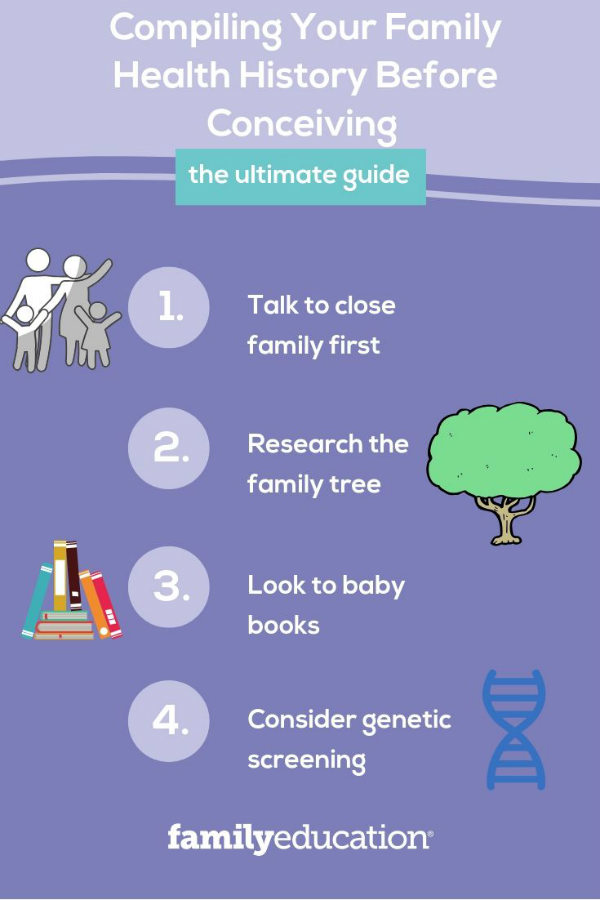Compiling Your Family Health History Before Conceiving

When you decide to try for a new baby, consider doing a bit of research into your family history. Why? You will want to know whether your future child is disposed to any illnesses or genetic abnormalities, so you can best prepare.
More: Should I Take An At-Home Genetics Test During Pregnancy?
Don't have time to read now, save for later:

Knowing Risks May Help Reduce Them
Sometimes you can work to prevent birth defects that your child might have. If there are known risk factors, an expecting mother can take certain precautions during her pregnancy to reduce the risk of her baby developing hereditary problems.
For example, cleft palate is a birth defect that is hereditary but it can also be influenced by environmental factors. If cleft palate runs in your family, a doctor can advise you on how to reduce the chance of you baby being born with one. During the first trimester of pregnancy, an expecting mother might stop or limit certain medications that increase the risk.
Planning for your Child’s Future
In other cases, planning ahead can support your child’s health. Sometimes, there is nothing you can do to reduce or prevent challenging traits from being passed on to your children. However, you may be able to best care for them if you educate yourself. Knowing what issues your future babies could face will help you meet their needs.
If your child will be at risk for developing certain illnesses or issues later in life, you will be doing them a favor. They may need to avoid certain lifestyle risks to keep themselves healthy. Or, they may need to have routine screenings. Awareness is one of the greatest gifts you can give your kids.
For example, if breast cancer runs in the family, your daughter will benefit from regular mammograms. She may also consider frequent self checks.
Reach out to Family First
Family Education panel expert and geneticist Dana Bresette explains that researching family health history “will involve talking to as many family members as you can to get a better handle on any health challenges your relatives may have faced.”
Researching your family history can be difficult. Many of us do not know much of our family tree. Even those who do might not always have the full picture.
As Bresette explains, “This can get tricky, as topics like breast cancer were once considered taboo not so long ago. The next thing to consider is discussing any of these conditions with your doctor and assess your potential risk.”
First, talk to any living relatives. Let them know why you are collecting the information. They’ll be more likely to be open and honest when they know your purpose.
Relatives can tell you about themselves as well as remember older generations. This is especially true for more noticeable defects or sicknesses.
Baby Books as a Genealogy Tool
Next, take a look through old baby books. Many people do not realize what a powerful tool these albums are. Mothers used them as a kind of medical record, and you may find useful information there that you won’t find anywhere else.
For more information, find out How to Use Baby Books as a Genealogy Tool.
Genetic Screening
If you still don’t have a comprehensive understanding of your family health history, genetic screening is a good idea. These screenings don’t just tell you where your ancient ancestors hailed from; they also provide genetic health information. Recessive genes that you carry but do not display are detected by these types of tests. If you and your partner share recessive traits in common, you can pass them on to your children.
All of us would benefit from digging deep into our family history so we can find out if we’re predisposed to any illnesses or health conditions. Doing this for our future children is a great service to them. With an awareness of hereditary risk, we can start doing what’s best for our kids before they are even born.
Considering genetic screening? Know How to Prepare for a Prenatal Genetic Counseling Session.

